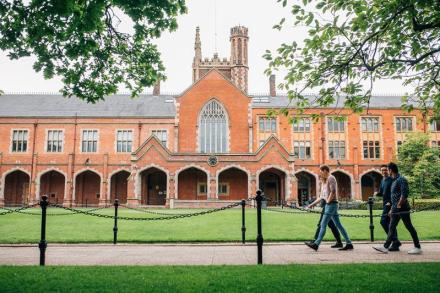CALL FOR PAPERS
Shakespeare Studies Today
Queen’s University Belfast, 14-17 June 2018 (BSA2018@qub.ac.uk)

Shakespeare Studies is one of the most rich and dynamic areas of interdisciplinary enquiry. It embraces historical explorations of Shakespeare’s canon, ranges across four hundred years of world theatre and performance history, and is continually renewed by Shakespeare’s iconic status in contemporary culture, film and media. Shakespeare draws together academics, teachers, theatre professionals, practitioners, readers and enthusiasts. At the same time, Shakespeare is a global commodity, reinvented in every culture and nation, meaning that his work prompts world-wide conversation. Following on from the 2016 celebrations, the 2018 BSA conference offers an opportunity for academics, practitioners enthusiasts and teachers (primary, secondary and sixth- form teachers and college lecturers) to reflect upon Shakespeare Studies today. What does Shakespeare Studies mean in the here-and-now? What are the current and anticipated directions in such diverse fields of enquiry as Shakespeare and pedagogy, Shakespeare and race, Shakespeare and the body, Shakespeare and childhood, Shakespeare and religion, Shakespeare and economics, Shakespeare and the law, Shakespeare and emotion, Shakespeare and politics, Shakespeare and war and Shakespeare and the environment? What is Shakespeare’s place inside the curriculum and inside debates around theory, queer studies and feminism? Where are we in terms of editing and materiality, and where does Shakespeare sit alongside his contemporaries, male and female? How does theatre practice, performance history, adaptation, cinema and citation figure in ever evolving Shakespeare Studies? In particular, this conference is keen to explore the challenges facing Shakespeare Studies today and to reflect on newer emergent approaches. Reflections on past practices and their reinventions for the future are also warmly welcomed.
Plenary Speakers include: Prof. Pascale Aebischer (University of Exeter), Prof. Clara Calvo (University of Murcia), Prof. Richard Dutton (Queen’s University Belfast), Prof. Courtney Lehmann (University of the Pacific) and Prof. Ayanna Thompson (George Washington University).
UK Premieres include: Veeram (dir. Jayaraj, 2016), a South Indian film adaptation of Macbeth, and Hermia and Helena (dir. Matías Piñeiro, 2016), an Argentine adaptation of A Midsummer Night’s Dream.
BSA 2018 also includes: Q+As with theatre director Andrea Montgomery (The Belfast Tempest, 2016) and film directors Jayaraj and Matías Piñeiro.
There are four ways to participate in BSA 2018:
- Submit an abstract for a 20-minute paper. Abstracts (100 words) and a short biography to be submitted by 1 October 2017 to BSA2018@qub.ac.uk
- Submit a proposal for a panel session consisting of three 20-minute papers. Abstracts for all three papers (100 words each), a rationale for the panel (100 words) and short speaker biographies to be submitted by 1 October 2017 to BSA2018@qub.ac.uk
- Submit a proposal for a performance / practice or education workshop or a teachers’ INSET session. For a workshop, submit a summary proposal outlining aims and activities and a biographical statement. For an INSET session (either a one-hour event or a twenty-minute slot), submit a summary proposal and biographical statement. All proposals to be submitted by 1 October 2017 to BSA2018@qub.ac.uk
- Submit an abstract to join a seminar. The seminar format involves circulating a short paper in advance of the conference and then meeting to discuss all of the papers in Belfast. Abstracts (100 words), a short biography and a statement of your seminar of preference to be submitted by 1 October 2017 to BSA2018@qub.ac.uk. Seminars include:
‘Digital Shakespeare: Histories/Resources/Methods’ led by Dr Stephen O’Neill (Maynooth University);
‘Shakespeare and Act/Scene Division’ led by Dr Mark Hutchings (University of Reading);
‘Shakespeare and the Book Today’ led by Prof. Emma Smith (Hertford College, Oxford);
‘Shakespeare and his Contemporaries’ led by Dr Lucy Munro (King’s College, London);
‘Shakespeare and Early Modern Playing Spaces’ led by Prof. Richard Dutton (Queen’s University Belfast);
‘Shakespeare and Europe’ led by Prof. Andrew Hiscock (Bangor University) and Prof. Natalie Vienne-Guerrin (University of Montpellier III-Paul Valéry);
‘Shakespeare and Film’ led by Dr Romano Mullin (Queen’s University Belfast);
‘Shakespeare and Marx’ led by Dr Matt Williamson (Queen’s University Belfast);
‘Shakespeare and Morality’ led by Dr Neema Parvini (University of Surrey);
‘Shakespeare and Pedagogy’ led by Dr Lindzy Brady (University of Sydney) and Dr Kate Flaherty (Australian National University);
‘Shakespeare, Performance and the 21st Century’ led by Dr Erin Sullivan (Shakespeare Institute, the University of Birmingham);
‘Shakespeare and Religion’ led by Dr Adrian Streete (University of Glasgow);
‘Women, Shakespeare and Performance’, led by Prof. Liz Schafer (Royal Holloway, University of London)
A number of Postgraduate / Practitioner / Teacher Bursaries will be available to cover the conference fee. When you submit your abstract / proposal, please indicate if you would like to apply for one of these and if you would like to attend all of the conference or Saturday only.
The BSA is proud to announce its next the locations, institutional partners and themes of its next three conferences:
Shakespeare Studies Today, 14-17 June 2018, Queen’s University, Belfast
Shakespeare: Race and Nation, July 2019, Swansea University
Shakespeare in Action, July 2020, University of Surrey
More info: http://www.britishshakespeare.ws/conference/



















